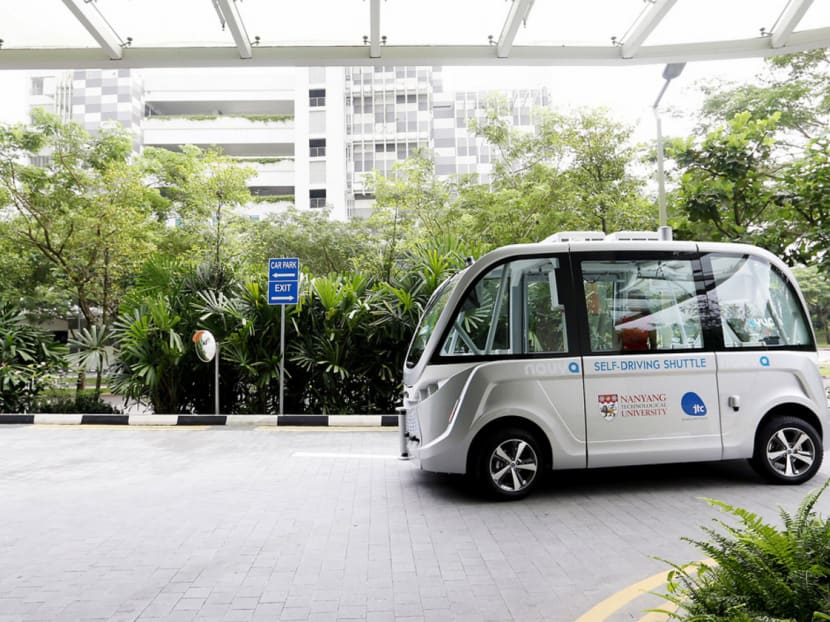Laws regulating private hire cars, AVs to enhance safety passed
SINGAPORE — Autonomous vehicles (AVs) and private-hire car services, two emerging and rapidly evolving areas in the transport landscape, will now be more tightly regulated, with changes to the Road Traffic Act passed yesterday to shore up safety standards for passengers and other road users — concerns parliamentarians flagged yesterday as they debated the amendments.

A self-driving minibus that is slated to hit the roads of Nanyang Technological University by March. TODAY file photo
SINGAPORE — Autonomous vehicles (AVs) and private-hire car services, two emerging and rapidly evolving areas in the transport landscape, will now be more tightly regulated, with changes to the Road Traffic Act passed yesterday to shore up safety standards for passengers and other road users — concerns parliamentarians flagged yesterday as they debated the amendments.
Among the changes to the Act include laws meting out penalties to private-hire drivers found operating without proper licences or adequate insurance.
The Transport Minister, meanwhile, will have powers to create new rules to more effectively regulate AV trials or its usage on public roads, such as by setting time and space limits.
Speaking in Parliament yesterday, Second Minister for Transport Ng Chee Meng said that while autonomous vehicles and private-hire car services can enhance the efficiency and convenience of Singapore’s land transport system, the Government cannot take a “completely laissez-faire approach”.
“We are therefore adopting a balanced, light-touch regulatory stance that protects the safety of passengers and other road users, and yet ensures that these technologies can flourish,” he said.
To be better oversee AV trials while remaining adaptable to changes in technology, the Transport Minister will have the powers to modify the application of certain provisions under the Road Traffic Act with regards to AVs or those operating them or conducting AV trials.
As for private-hire car services, service operators with three or more instances of their drivers committing major offences within the preceding 12 months, will see drivers, who will have to be licenced, being barred from driving for them.
Such offences include not having a valid vocational licence and adequate insurance as well as using an unlicensed private-hire car to provide services.
A driver who drives for an operator during the suspension period will be fined up to S$1,000 or jailed up to three months or both for the first offence. Subsequent offences will result in a fine of up to S$2,000 or jail of up to six months or both. Drivers may also have their vocational licence suspended or revoked.
On top of that, service operators can be also be fined up to S$10,000 for every offence.
Meanwhile, other changes to the Act see penalties for reckless or dangerous driving raised from S$3,000 to $5,000 for first-time offenders and S$5,000 to S$10,000 for subsequent offences.
The Land Transport Authority (LTA) will also now be able to bar foreign-registered vehicles from entering Singapore if they have outstanding unpaid fees and charges such as the Vehicle Entry Permit fees.
Ten Members of Parliament rose to speak on the amendments. Workers’ Party Non-constituency MP Dennis Tan pointed out that there may be difficult issues of liability in scenarios such as when driverless vehicles react to a car driving against traffic.
With accidents involving AVs bound to happen, Mr Henry Kwek (Nee Soon GRC) called on the Government to bring insurers on board, noting that industry experts have told him that the lack of insurance is emerging as a “key bottleneck” for the full commercialisation of AVs.
Responding to Mr Tan, Mr Ng said that when presented with such novel technologies, the courts will often draw from other existing technologies. For instance, in the case of AVs, reference can be taken from autopilot systems in airplanes and maritime vessels.
He also said the LTA is studying the use of AVs with representatives from the AV, motor, legal and insurance industries.
Several MPs also shared that cabbies’ incomes have taken a hit due to competition from Uber and Grab, with Mr Melvin Yong (Tanjong Pagar GRC) calling for the playing field to be levelled, asking if the Government would consider imposing a framework similar to the LTA’s Quality of Service standards currently adhered by taxi operators to the private-hire car operators.
Mr Ang Hin Kee (Ang Mo Kio GRC) proposed that the LTA impose a licensing fee of 0.02 per cent of the total revenue of private-hire car services, similar to taxi operators. Mr Ng responded that a suspension order is a “significant regulatory threat” which is sufficient to get private-hire car service operators to comply with rules.
Rather than impede the adoption of these technologies which benefit all Singaporeans, Mr Ng said more efforts should be focused on helping transport workers to adapt, he added.






